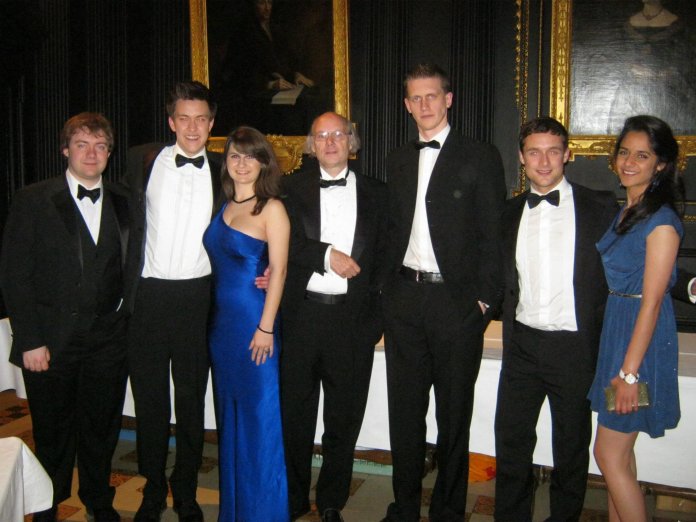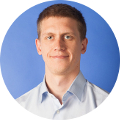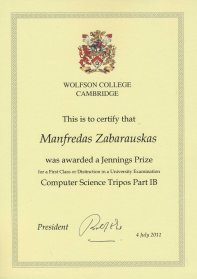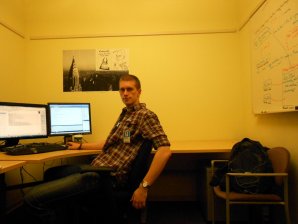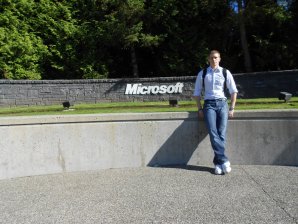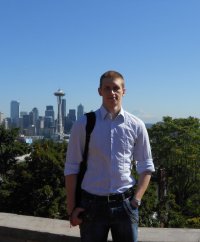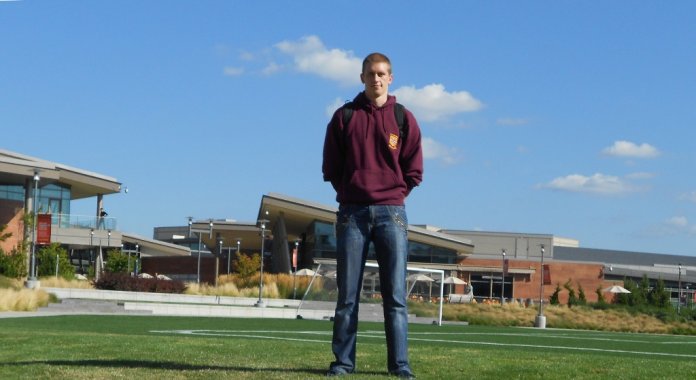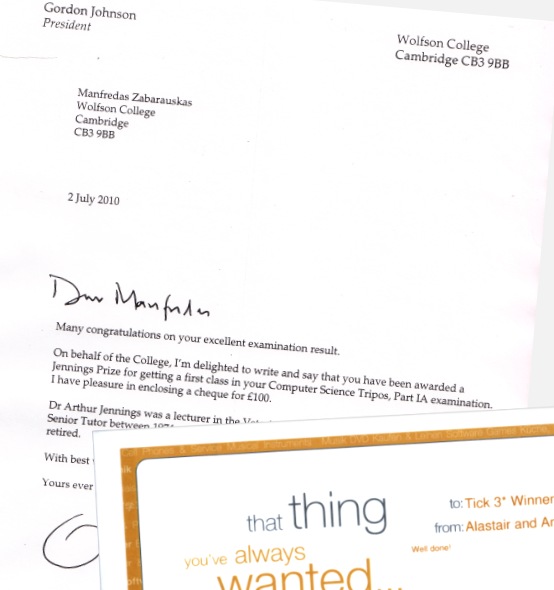Nearly a year has passed since the last update. In order to at least partially rectify this situation, I am planning to publish a series of posts describing what have I been up to during that time. A natural place to start then is the final year of Computer Science undergraduate degree (also known as CST Part II) at Cambridge.
CST Part II undoubtedly offers a largest amount of flexibility out of all years of the Tripos. Three written exams (or as they are known in Cambridge, papers) have to be taken at the end of the year. Each paper contains fourteen questions, out of which five have to be selected and answered during a three hour exam.
This implies that it is enough to select a proper subset of subjects (out of twenty-four subjects offered in Part II) in order to do well in the final exams. This is where various strategies come into play.
Here is one that worked for me:
- Choose the courses that you are really interested in,
- Choose the courses that you are really good at.
The only remaining task then is to identify courses that satisfy the above criteria.
Let's start with #2: it is easy to be good at well-taught courses. That includes courses with well-written handouts, good exercise sheets and effective lecturers. Here is my list (but YMMW):
- All courses by Prof John Daugman (this typically includes "Information Theory and Coding" and "Computer Vision"). There are multiple good reasons for taking these courses: first of all, it is really worth seeing a polymath at work. I have not seen anyone closer to a Renaissance man than John Daugman. Secondly, the questions for ITC and CV follow the round-robin pattern over the years and never deviate from the material in the learning guides.
- "Business Studies" and "E-Commerce" courses by a serial entrepreneur-in-residence Jack Lang. I have been to a number of "business" courses, both within and outside the academic environment. I have not seen anyone eliminate the bullshit factor more effectively than Jack. This is both a tremendously effective skill to learn, and provides a very down-to-earth set of introductory lectures to anyone who aspires to be an entrepreneur. Exam-wise, Jack follows the same no-bullshit approach. The questions test your basic knowledge and provide an easy way to grab fifteen out of twenty marks (the median results for the year 2011-2012 were 15/20 for BS and 16/20 for E-C).
- "Computer Systems Modelling" by Dr Richard Gibbens. Besides the fact that Dr Gibbens is a very good lecturer, he is also very stable when it comes to setting the exam questions (viz. one out of two questions is always about the probability theory and the other is about queuing theory). Stability is predictability, and predictability is an expensive commodity in Cambridge exams.
- "Bioinformatics" (also known as "Algorithms III") by Dr Pietro Lio'. Despite sporting a couple of PhDs, Dr Lio' is a tremendously helpful lecturer. Seriously. He demonstrated it multiple times by arranging additional examples classes, Q/A sessions, handing out complementary lecture material and, of course, by setting the exam questions that yielded "very good results, well spread but with very few low marks" (his own words).
- "Temporal Logic and Model Checking" by Prof Mike Gordon (not to be confused with the evil "Hoare Logic" course!). Behind the nasty notation hurdle (see the image on the right) lies another self-contained and straightforward course. This is also reflected in the exam results: the median marks for both TL&MC questions in 2011/2012 were 17/20!
Once again, the list above should be taken with a grain of salt, especially for the relatively young courses like Bioinformatics or TL&MC, where a large variance in the exam question difficulty has not been statistically disproved.
However, written papers account for only 75% of the final grade. The remaining 25% is allocated for the Part II dissertation. One of the biggest challenges in Part II is juggling between writing up the dissertation and learning for the exams, especially in the Easter term.
Here is my solution:
- Take all the courses in Michaelmas and Lent terms.
- Do not take any courses (apart from business ones) in the Easter term.
- Finish the implementation of the Part II project by the end of Christmas break. If you need to spend all your break on project work - do so; leave the revision for the Easter term (see below).
- Finish the write-up of the dissertation in the first two weeks of the Easter term. If you need to spend the whole Easter break on the dissertation work - do so.
- After the first two weeks of the Easter term you should be done with your dissertation and your courses (modulus a couple of business lectures per week). This means that between the first day of week three in the Easter term and the day minus-one of the first exam, you should be spending 95% of your time revising.
This approach has two main strength-points: first of all, the amount of task juggling is reduced to bare minimum. You work on your Part II project during the holidays, you study during the first two terms, and you spend all your time revising during the Easter term. Secondly, you avoid the "re-learning" (c.f. with Michaelmas courses in Parts 1A and 1B) since there is no new material between the revision and the exams to interfere. It tremendously reduces the amount of time required to prepare for 10-11 courses.
Finally, three tips for your revision:
- Go for the quality, not for the quantity. It is much better to have six strong questions in each paper than seven or eight average ones. Most people will go for the latter, making a huge mistake. Having four strong answers yields you a first class result while still leaving two questions for risk management.
- Find a suitable working space and establish a working regime. Separate "working" and "leisure" environments (e.g. work at the library instead of your college room). Seeing fifty people working hard around you both increases the motivation and decreases the temptation to procrastinate.
- Create a revision plan and follow it. Download Microsoft Project from DreamSpark and create a Gantt chart (you can see mine above). I am not joking. It is surprisingly easy to slip up by a day-or-two ("I will revise these two topics tomorrow and I will be done with the course.") Having an interactive schedule which can be easily updated, helps to see what trade-offs are actually being made ("I could revise these two topics tomorrow, but that will leave me only one day to revise the whole Information Retrieval subject").
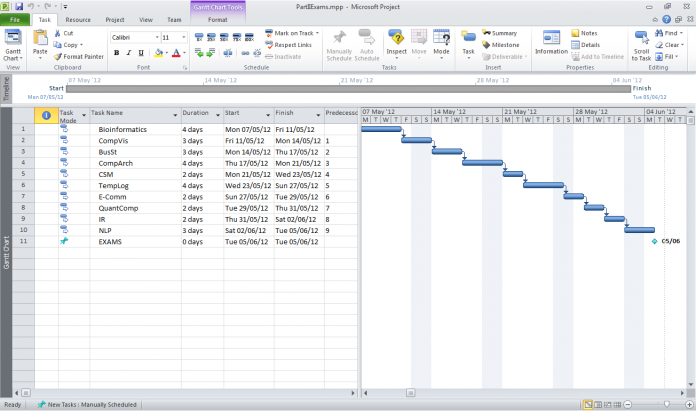
Examination revision plan (Gantt chart in Microsoft Project)
Perhaps more importantly though, it left me with enough time to do a Part II project that was highly-commended by the Computer Laboratory, and a >200 page dissertation that was highly-commended in the international 2012 Undergraduate Awards. More on the Part II project will follow in the later posts.
It's not all doom and gloom. With Bjarne Stroustrup, creator of C++. Queens' College, Cambridge (2012)